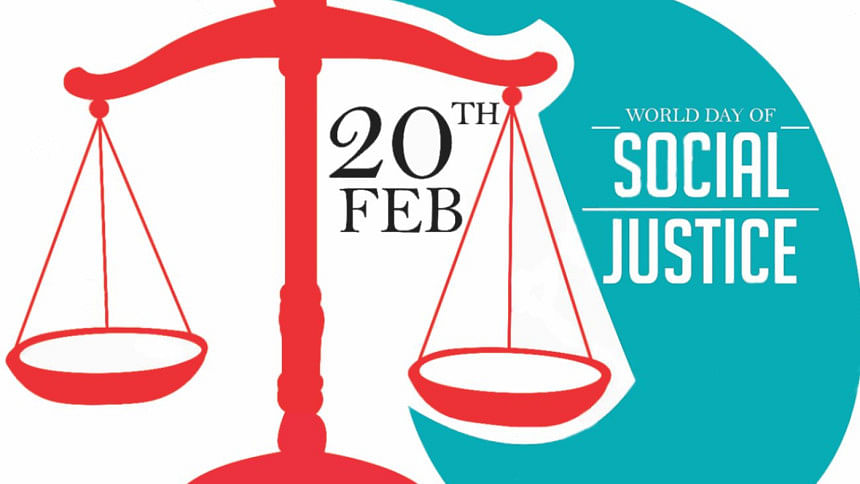In the hope of a society for all

World Day of Social Justice is a relatively new edition to the diverse string of international observance days as declared by the United Nations. Having started in 2009, February 20, every year has now been utilised to commemorate, promote and mobilise all-encompassing social justice issues such as poverty, economic exclusion, unemployment and so on. In a country like ours, ensuring social justice is a colossal challenge. Under the umbrella of “a society for all” barriers on gender, age, race, ethnicity, culture or disability need to be removed.
Starting with what hits home the hardest, in the perpetual crusade against gender inequality Bangladesh stands strong. According to the Global Gender Gap Report, 2015 undertaken by World Economic Forum (WEF), out of the 145 countries surveyed, Bangladesh ranked 64th, while India, Pakistan and China ranked 114, 144, and 87, respectively, in terms of Gender Equality Index. However,disregard to human life still thrives in the form of gender based violence and misconduct. Occurrences like that of Pohela Boishakh at TSC, Dhaka University cannot simply be overlooked as isolated since many more of these happen all over the country every day and stay unreported.
On the other hand, while the Deputy Speaker of the parliament M Fazle Rabbi Mian on February 13, 2016 vouched for government's separate allocations in the new budget for children and disabled people, the progress has been sluggish. Moreover, since 2015 there has been oddly high number of child abuse cases amongst which the viral lynching video taken by the abuser himself has led to six death sentences.
The very recent pass to Draft Policy for Domestic Workers will revolutionise the ways domestic help are treated in Bangladesh, in a legal and justifiable way.With the anniversaries of the tragic Rana Plaza collapse (2013) and Tazreen Fashions fire (2012) lying ahead, the regret takes toll as the garment factories still remain potential death-traps for people who contribute the most to the GDP. Halfway through the five-year, legally binding agreement that an international coalition of brands and organizations signed up, promising to making Bangladesh's garment industry safe, the painfully slow progress of Bangladesh Accord on Fire and Building Safety questions its own accomplishment.
Light shines even less bright on rights of indigenous people and migrants. “MorThengari” was set to be the first feature film made entirely in Chakma language (spoken by almost 300,000 people in Bangladesh) but it never made past the Bangladesh Film Censor Board due to its incapacity to review any films apart from Bengali and English ones (though it's been claimed that even if the Board was capable the film would not have made past it due to showing sensitive armed forces issue in the hill tracts). On the large scale, there are more than 40 languages spoken by indigenous people, however, these are becoming endangered fast owing to next to none learning opportunities in institutionalised education.
Fundamental rights of the Indo-Bangladesh enclave dwellers have finally been safeguarded after a 68 years of distress which is a ground-breaking step in achieving “a society for all”.On the contrary, insecurity seems to have increased among the religious minority groups in Bangladesh.
To highlight the issues in the international arena, 2015 saw appalling disregard to human dignity through the astounding number of migrants and refugees crossing borders to the EU countries from Middle East and Africa. Humanity washed ashore with the lifeless body of 4 year old Syrian Aylan Kurdi whose name was known and cared about among the 2600 refugees who drowned in the Mediterranean to reach Greece and Italy during 2015.
In a developing third world country, always striving for equality among myriad societal classes, everything comes down to poverty and lack of resources. In Growth and Equity by Dr Sadiq Ahmed it has been analysed that the top 10% of the population holds the 35% of the national income. Almost all our problems can rightfully be traced back to economic inequality. Social justice aims at developing solidarity, equality and harmony among all classes. This international day demands limelight because it is bound to initiate well-timed discussions among the citizens and create peer-pressure on the government to emphasise the problems we can all relate to as a developing country.
The writer is a student of Law, University of London International Programmes.

 For all latest news, follow The Daily Star's Google News channel.
For all latest news, follow The Daily Star's Google News channel. 



Comments